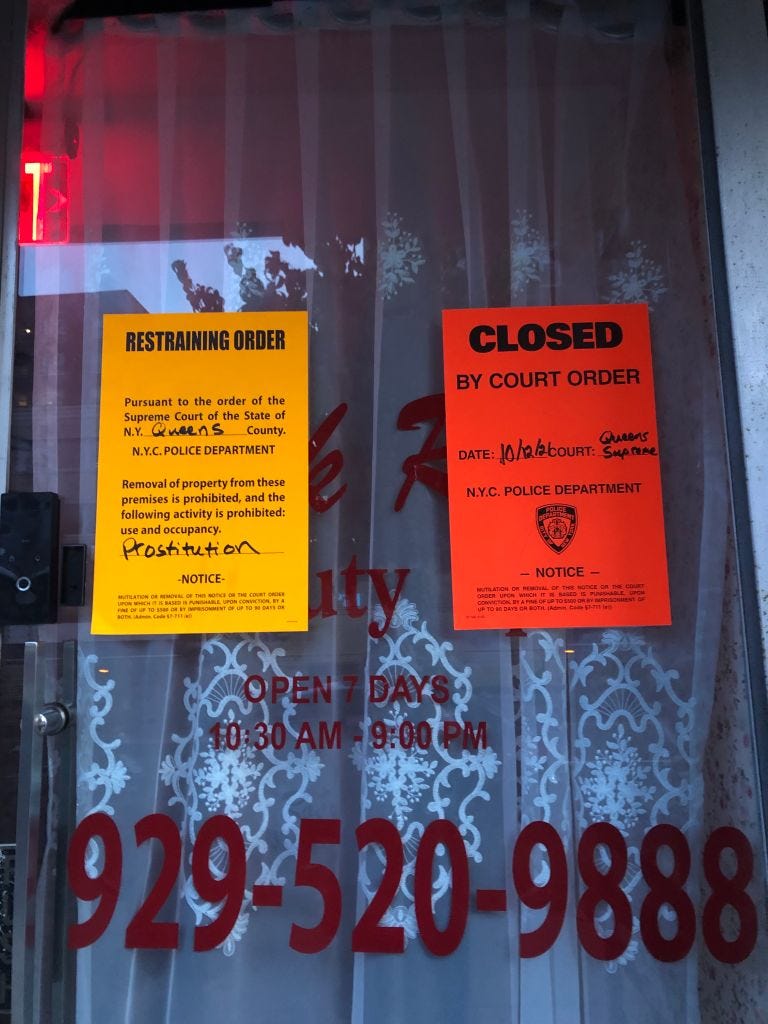
The Free Press

If you’re a New Yorker, you probably know how Mayor Eric Adams spent part of last Friday afternoon: getting his eyebrows threaded at a salon in Corona, Queens. The now-viral moment was meant to symbolize how civilized the whole area had become in the past 90 days.
Watch the mayor get his eyebrows done here:
A few months earlier, locals had complained that this wasn’t the kind of block you’d want to set foot on, let alone visit for a spa treatment. The only massage parlors and salons open for business seemed to be fronts for the neighborhood’s booming sex trade, with police estimating as many as 50 brothels operating in the area. The neighborhood had even developed a nickname: the “Market of Sweethearts.”
“It was anarchy outside,” said Ramses Frías, a second-generation Queens native. “People were scared to leave their homes.”
After Frías and other locals held a series of rallies and protests, Adams deployed hundreds of NYPD officers, plus 50 state troopers, in a 90-day crackdown dubbed “Operation Restore Roosevelt,” referring to Roosevelt Avenue, the neighborhood’s main thoroughfare.
Frías, 43, who lives in the same apartment his parents raised him in, told me that the area has always had a prostitution problem—but that it used to be restricted to certain corners or at least take place indoors, tucked away in massage parlors. But it was also one of the few New York communities where immigrants could afford to buy a home—something Frías’s mother was able to do after coming to the U.S. from Haiti.
Things began to change in 2021, when the NYCLU and other progressive groups successfully lobbied the state to repeal an anti-loitering law, which they claimed “enabled law enforcement to target Black and Brown transgender women, non-binary people, immigrants, and low-income communities for innocuous behavior.” They referred to the law as the “Walking While Trans Ban.” Frías says the rollback hamstrung police from taking action just as thousands of migrants were streaming into New York, exacerbating the problems mounting on Roosevelt Avenue.
“There would just be twenty women standing outside a business and they would be saying, ‘massage, massage,’ but everybody knows what that means,” said Frías.
Prostitutes on Roosevelt Avenue began operating in broad daylight about two years ago. On their way to school, Frías said, kids had to start walking past scantily clad women counting cash. In September, parents at a local elementary school passed a resolution demanding “increased school safety measures.” Among the issues they said their children encountered on the way to and from school: “Open prostitution and illegal massage parlors employing sex workers,” “rampant drug use,” and “organized crime syndicates.”

From the moment the city announced its campaign to crack down on crime in the area, progressives began to protest. Groups like Red Canary Song, which advocates for “BIPOC, LGBTQIA+, Trans GNC, and Disabled Sex Workers,” claimed to speak on behalf of the people of Queens—despite being co-founded by a Columbia-educated dominatrix (other “core organizers” include a Barnard graduate turned “BDSM practitioner,” a Brown University professor, and a Yale graduate student with they/he/she pronouns).
“We demand the removal of state and local troops from Queens,” an October Red Canary Song press release demanded. “These dehumanizing narratives are fabricated and weaponized to justify increased surveillance, perpetuating our community’s precarity through police violence.”
Last Friday, when Mayor Adams emerged from the threading salon with his brows freshly zhuzhed, I asked him what he made of the groups that had opposed the operation.
“I am a progressive,” he countered, flanked by an entourage at least a dozen deep. “Those who run around and say they’re progressive, they have hijacked the work of progressives—and leaving people to sell their bodies on the street, to be victims of sex trafficking and allowing pimps to abuse them—if they believe that’s progressive, they need to look up the term progressive.”
He then turned and headed toward another neighborhood attraction he wanted to check out—a restaurant. Two teenage girls squealed as he walked past them, jumping up and down with backpacks swinging behind them. A woman in brown earmuffs called out to him in a Spanish accent: “Mayor, mayor,” she said, with one hand clutched to her heart near a gold necklace. “It’s so beautiful now, everything is cleaner.”




